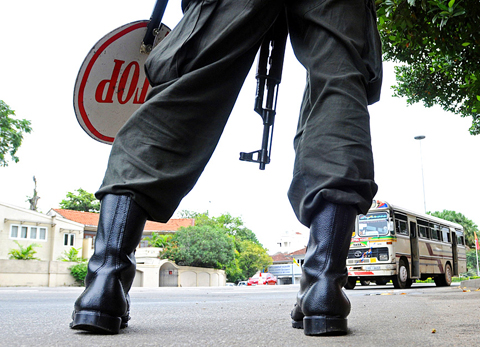Accusations that Pakistan helped a militant group bomb India’s embassy in Afghanistan cast a cloud yesterday over the start of an eight-nation South Asian summit aimed at fostering regional cooperation.
India, Afghanistan and Sri Lanka, all fighting decades-old insurgencies, exhorted South Asian nations yesterday to pool efforts to fight terrorism, which they said posed the biggest threat to the region’s stability.

PHOTO: AFP
‘GREATER GRIP’
“Terrorism and its sanctuaries are gaining a greater grip in Pakistan,” Afghan President Hamid Karzai said in a speech at the start of the two-day summit.
He said terrorists in Pakistan were getting “institutionalized nurturing and support.”
Afghanistan was the worst victim of international terrorism, Karzai said.
Indian Prime Minister Manmohan Singh said the recent attack on his country’s embassy in Kabul and a string of bombings in Indian cities “are gruesome reminders of the barbarity that still finds a place in South Asia.”
“It remains the single biggest threat to our stability,” he said.
ACCORD
The summit is expected to approve an accord on fighting terror, including freezing funds used for attacks and agreements on the creation of a regional development fund and a food bank aimed at coping with skyrocketing food prices.
Tensions between India and Pakistan have heightened amid accusations that members of Pakistan’s intelligence service have aided Islamic militants fighting in Afghanistan and the Indian portion of Kashmir.
The New York Times reported on Friday that US intelligence agencies had intercepted communications between Pakistani intelligence officials and Islamic militants implicating the intelligence service in the July 7 attack on the Indian Embassy in Kabul, which left at least 41 people dead.
Pakistan dismissed the accusation as “rubbish” and promised to cooperate with neighboring countries to combat terror.
WORST OFF
Pakistani Prime Minister Yousuf Raza Gilani said yesterday that his country had suffered the most from terrorism, though it was afflicting all countries of the region.
The summit is being attended by leaders from Afghanistan, Bangladesh, Bhutan, India, the Maldives, Nepal, Pakistan and Sri Lanka.
The region, home to one-fifth of the world’s population and many of its most impoverished people, has been plagued by terror attacks.
Pakistan is grappling with restive tribal regions along its border with Afghanistan, where fighting between insurgents and government troops intensified this week.
TALIBAN
The Afghan government is facing a resurgent Taliban and a spate of bombings has hit India in recent weeks.
Afghan officials have repeatedly said Pakistan is not doing enough to crack down on militants, an allegation which Pakistan denies.
The South Asian Association for Regional Cooperation was set up in 1985 to promote economic cooperation, but progress in most areas has been slow, mainly because of the rivalry between India and Pakistan, and the organization has often been derided as little more than a talk shop.
Also See: Fighting breaks out ahead of regional summit in Colombo

The US government has signed defense cooperation agreements with Japan and the Philippines to boost the deterrence capabilities of countries in the first island chain, a report by the National Security Bureau (NSB) showed. The main countries on the first island chain include the two nations and Taiwan. The bureau is to present the report at a meeting of the legislature’s Foreign Affairs and National Defense Committee tomorrow. The US military has deployed Typhon missile systems to Japan’s Yamaguchi Prefecture and Zambales province in the Philippines during their joint military exercises. It has also installed NMESIS anti-ship systems in Japan’s Okinawa

‘WIN-WIN’: The Philippines, and central and eastern European countries are important potential drone cooperation partners, Minister of Foreign Affairs Lin Chia-lung said Minister of Foreign Affairs Lin Chia-lung (林佳龍) in an interview published yesterday confirmed that there are joint ventures between Taiwan and Poland in the drone industry. Lin made the remark in an exclusive interview with the Chinese-language Liberty Times (the Taipei Times’ sister paper). The government-backed Taiwan Excellence Drone International Business Opportunities Alliance and the Polish Chamber of Unmanned Systems on Wednesday last week signed a memorandum of understanding in Poland to develop a “non-China” supply chain for drones and work together on key technologies. Asked if Taiwan prioritized Poland among central and eastern European countries in drone collaboration, Lin

The Chien Feng IV (勁蜂, Mighty Hornet) loitering munition is on track to enter flight tests next month in connection with potential adoption by Taiwanese and US armed forces, a government source said yesterday. The kamikaze drone, which boasts a range of 1,000km, debuted at the Taipei Aerospace and Defense Technology Exhibition in September, the official said on condition of anonymity. The Chungshan Institute of Science and Technology and US-based Kratos Defense jointly developed the platform by leveraging the engine and airframe of the latter’s MQM-178 Firejet target drone, they said. The uncrewed aerial vehicle is designed to utilize an artificial intelligence computer

Renewed border fighting between Thailand and Cambodia showed no signs of abating yesterday, leaving hundreds of thousands of displaced people in both countries living in strained conditions as more flooded into temporary shelters. Reporters on the Thai side of the border heard sounds of outgoing, indirect fire yesterday. About 400,000 people have been evacuated from affected areas in Thailand and about 700 schools closed while fighting was ongoing in four border provinces, said Thai Rear Admiral Surasant Kongsiri, a spokesman for the military. Cambodia evacuated more than 127,000 villagers and closed hundreds of schools, the Thai Ministry of Defense said. Thailand’s military announced that